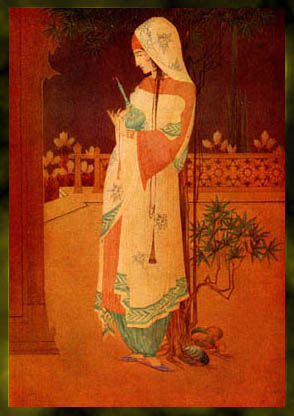mired in distress
I was drinking wine, mired in my distress,
And fell asleep before my heart could be expressed.
When I woke from my drunken sleep, I found
My love gone, the candle out, Saghi sleeping sound.
#1647: From Rumi's Kolliyaat-e Shams-e Tabrizi
The only odd element in today's quatrain is the Saghi or saqi, the young servant who hands out the wine cups at banquets. What is odd is that the poet wakes with the Saghi presumably in view and "sleeping sound". So he has been accompanied in his sleeping by his servant.
It has been stated time and again by every good Muslim that comments on such poems that the wine is emblematic of Sufism itself. To take in wine and get drunk is to take in Sufi wisdom and become ecstatic. In this particular verse, the wine acts as literal wine does. It helps to drown sorrows but can inhibit full sexual expression if the soporific effects take over too soon. You can also end up with a sexual partner not at all originally intended, as is suggested in this case.
Reading this as Sufi wine, however, there appears to be a warning about taking an interest in Sufism as an escape from some hardship in life, as a means of dealing in a disappointment, perhaps especially relating to a love (whether of a woman or of a career or cultural pursuit). If this verse is related to Rumi's biography, then it would seem to refer to a time when he was taking in Shams' teachings avidly but largely unconsciously (asleep). Shams' disappearance caused him to wake up, whereupon he realized the sad state he was in, without his love, without a light, and with no immediate access to further wisdom (since the wine bringer is out of action).
What the verse does not tell us is just what was the nature of Rumi's distress. He took to drinking wine, imbibing Sufi wisdom, long before Shams disappeared. Once he was gone, yes, there was a clear cause for distress. But before that, what had been distressing him? My guess is that it was a generalized sense of purposelessness, a loss of meaning in life. At the time that Rumi met Shams he was in full manhood, quite adequately successful in all the ways that a man should be. He had a family, a good career, an established reputation, and probably considerable wealth with property and servants or slaves. Despite all of that, he was "mired" in distress. It's possible also that he didn't even realize it, that it was only the severe distress of losing Shams that made him recognize the earlier severe distress that had drawn him to his teaching in the first place.
To me this little verse says that just as wine is no answer to all the big unanswered questions of life, so too Sufism is no answer. The only truth lies in feeling, really feeling the distress that comes of those big unanswered questions. This is a mysterious pain that also seems capable of shedding light. It may be best to invite it in and make it welcome.
The heart asks pleasure first,
And then, excuse from pain;
And then, those little anodynes
That deaden suffering;
And then, to go to sleep;
And then, if it should be
The will of its Inquisitor,
The liberty to die.
- Emily Dickinson (especially for Bob)
Female Saqi




1 Comments:
Thanks for the Emily!
Post a Comment
<< Home